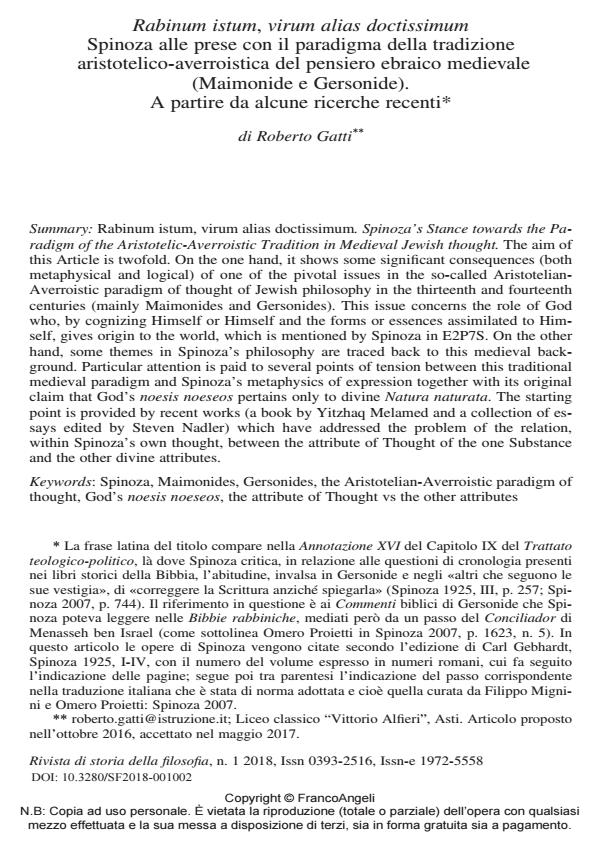Rabinum istum, virum alias doctissimum Spinoza alle prese con il paradigma della tradizione aristotelico-averroistica del pensiero ebraico medievale (Maimonide e Gersonide). A partire da alcune ricerche recenti
Journal title RIVISTA DI STORIA DELLA FILOSOFIA
Author/s Roberto Gatti
Publishing Year 2018 Issue 2018/1
Language Italian Pages 27 P. 29-55 File size 175 KB
DOI 10.3280/SF2018-001002
DOI is like a bar code for intellectual property: to have more infomation
click here
Below, you can see the article first page
If you want to buy this article in PDF format, you can do it, following the instructions to buy download credits

FrancoAngeli is member of Publishers International Linking Association, Inc (PILA), a not-for-profit association which run the CrossRef service enabling links to and from online scholarly content.
Rabinum istum, virum alias doctissimum. Spinoza’s Stance towards the Paradigm of the Aristotelic-Averroistic Tradition in Medieval Jewish thought. The aim of this Article is twofold. On the one hand, it shows some significant consequences (both metaphysical and logical) of one of the pivotal issues in the so-called Aristotelian-Averroistic paradigm of thought of Jewish philosophy in the thirteenth and fourteenth centuries (mainly Maimonides and Gersonides). This issue concerns the role of God who, by cognizing Himself or Himself and the forms or essences assimilated to Himself, gives origin to the world, which is mentioned by Spinoza in E2P7S. On the other hand, some themes in Spinoza’s philosophy are traced back to this medieval background. Particular attention is paid to several points of tension between this traditional medieval paradigm and Spinoza’s metaphysics of expression together with its original claim that God’s noesis noeseos pertains only to divine Natura naturata. The starting point is provided by recent works (a book by Yitzhaq Melamed and a collection of essays edited by Steven Nadler) which have addressed the problem of the relation, within Spinoza’s own thought, between the attribute of Thought of the one Substance and the other divine attributes.
Keywords: Spinoza, Maimonides, Gersonides, the Aristotelian-Averroistic paradigm of thought, God’s noesis noeseos, the attribute of Thought vs the other attribute
- Ibn Gabirol (Avicebron) Roberto Gatti, pp.383 (ISBN:978-2-503-60552-4)
Roberto Gatti, Rabinum istum, virum alias doctissimum Spinoza alle prese con il paradigma della tradizione aristotelico-averroistica del pensiero ebraico medievale (Maimonide e Gersonide). A partire da alcune ricerche recenti in "RIVISTA DI STORIA DELLA FILOSOFIA" 1/2018, pp 29-55, DOI: 10.3280/SF2018-001002